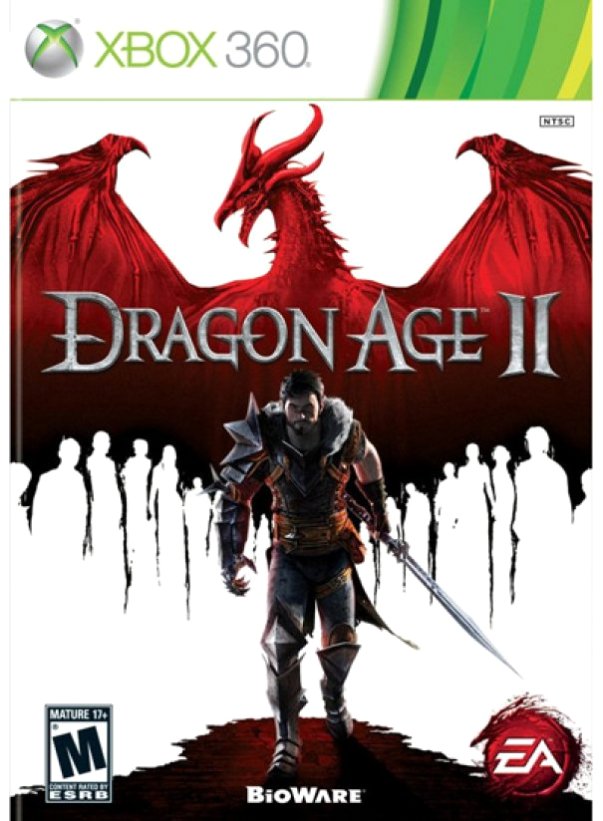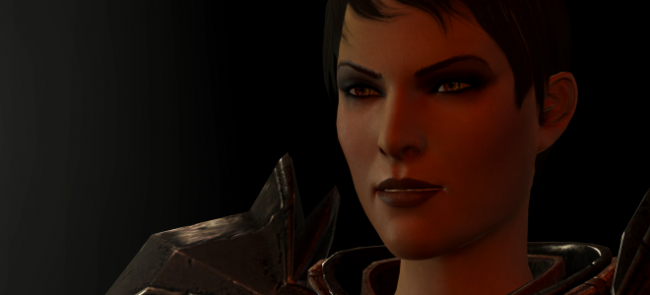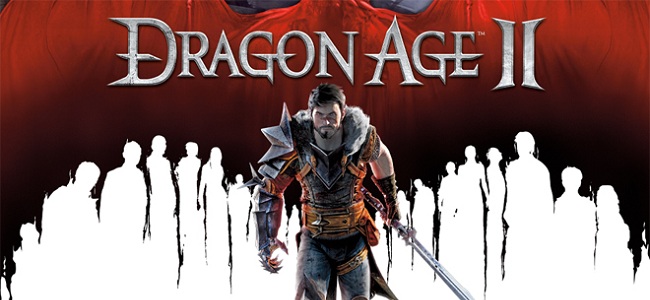![]()
As the blight consumes Ferelden, thousands flee for their lives; many perish, but some make it to the neighboring kingdom of Kirkwall. Among them is Hawke, an individual whose influence will soon determine the fate of the city. As you witness his/her/its rise to power you’ll experience action (to an extent), romance, tragedy, betrayal, and load screens…so very many load screens.
 Dragon Age II
Dragon Age II
Platforms:Microsoft Windows, PlayStation 3, Xbox 360, Mac OS X
Developer:Bioware
Publisher:Electronic Arts
$59.99
Story
In Dragon Age 2 you take on the role of a battered Ferelden refugee named Hawke who is fighting to escape the fallen nation with his family intact. After a brief, but battle intensive, getaway, the Hawke family arrives at the docks of the neighboring kingdom of Kirkwall. The city has been closed off though, much to the dismay of hundreds of refugees. Luckily, the Hawkes used to have influence and family in the city, and through the dealings of a shady uncle are awarded access. The story of DA2 takes place almost entirely within the walls of Kirkwall, and focuses on Hawke’s rise to fame, fortune and beyond. While this is a stark contrast to the epic scale of Origin’s story, which focuses on Ferelden’s fall to the Darkspawn blight, I enjoyed the more personal story that DA2 offered.
Politics play a large role in the story, and as I progressed through the plot I found that dialogue sequences far outweigh the fighting. Because of this it’s good to see that several improvements have been implicated over the old dialogue system. Most importantly, gamers who played Mass Effect 1&2 will instantly recognize the wheel of dialogue options that provides players with a clear idea of how their chosen response will affect the scene’s outcome. The dialogue options given this time around also feel more fluid and interesting (beyond varying degrees of good/evil responses you also have the “smart-ass” response, which is endlessly entertaining), and it’s satisfying to see your character’s uncontrolled dialogue adapt to your taste.
There are a couple of things that bugged me about the storytelling in DA2. First, the story is presented as a series of flashbacks that are narrated by a dwarven companion of Hawke’s named Varric. He tells the story of Hawke’s rise to power to a “Seeker” of the Chantry, who is searching for the hero. While I did enjoy this narrative approach at the beginning, possibly because it’s a rare thing to see in video games, there are a few instances where Varric’s narration becomes unreliable; the seeker points out that she heard that it happened a different way or that characters do or say things that are out of place. I’m sure many folks are fine with this, but it made difficult for me to take the story seriously. The other issue is the openness of the story; there are maybe three critical plot points in the campaign whose outcome defines Hawke’s character or the city of Kirkwall, but at no point is there a fully realized villain to overcome or goal to achieve. For the most part, the story of DA2 felt like a “choose your own adventure” book that constantly had me questioning (or regretting) my decisions, and while I know that Bioware is well known for this kind of storytelling, I still would have liked to have something solid (like a villain) to focus on.

Gameplay
Dragon Age 2’s combat system is comparatively an improvement to its predecessor. You still fight as a group and can easily switch between characters to control their actions, but I felt too displaced from the combat. After setting up how individual squad members act and react to battle situations, my role as the player was to ensure simply that everyone drank their health potions, make sure that the ranged attackers stayed out of the heat, and to mash the attack/spell buttons of the character I was currently controlling. Essentially, I felt like a babysitter to battle.

The best aspect of DA2 had to be the numerous missions that are offered, and even though most of them boiled down to kill, rescue, or retrieve-type mission, they each had a well thought out backstory and plot-development that kept interest high. The only downside to completing most all of the quests was that they required you to jump between districts – which meant load screens, and lots of them.
From a graphical standpoint, DA2 looks pretty good; the districts of Kirkwall are distinct from one another and the natural environments of the Free Marches are lush and full of color. The total map size is limited though, and after the first third of the game, you will be revisiting the same areas repeatedly. One particular environment that I got tired of seeing were the various caves surrounding Kirkwall; there were maybe two distinct-looking caves and all of them shared the same layout.
Verdict
For all of its faults, Dragon age 2 is a fun game that will keep fans interested in the series, and despite my complaints about the story, it had some great moments that made me cheer (and scream) at the monitor. This can be contributed to the game’s fantastically designed dialogue system, a cast of interesting and thought out characters, and Bioware’s unique and powerful story telling techniques. Mostly, I was just disappointed that there wasn’t more to the world, more places to explore, and that Bioware didn’t detail the happenings outside Kirkwall more.




9 Comments
It’s a shame to hear about the game play. Sounds to me like it’s very similar to FF13 and FF14 in that sense (set everyone up and button mash to victory). I had no idea what this game was like but I saw a trailer for it somewhere. It looked interesting but I was hoping it was an action/adventure game instead of a tower defense/Dynasty Warriors type game.
Although I haven’t finished the game (I think I’m about halfway), the combat is not bad. Mostly, your team will behave intelligently (but as the author stated, range has a habit of closing in sometimes), heal themselves with spells, etc. There is also a rudimentary AI system where you can specify parameters and what action should the individual squad member take (i.e. health below 25%, drink health potion, surrounded by 3 enemies, use x ability).
Nevertheless, in most encounters you don’t have to babysit them, there are only some instances where you have to pause the action frequently to take control (there is a particularly nasty boss in the end of part 2 – 1 year after arriving in Kirkwall – that takes a lot of moving and micro-management).
Definitely though, you play the game for the developing storyline.
I’ve only played as the rogue; barring the times that I’ve gone down and had to pick up as one of the other characters, and there is a Dynasty Warriors feel in a way, but you never fit 1000 enemies in a section like Dynasty Warriors. (Of course I’m in the second ‘chapter’ so there might be that at the end like in Origins) I’ve also found that 4E concepts work well. You have four characters in your party and you can get them to fit the controller/defender/leader/striker roles. I haven’t played FF13 or FF14, but I did play FF12 and there is a tactics planning aspect that; while the Origins had, looks to be a bigger part in DA2.
If I had to describe the gameplay, it’s FF12 without the automation of the character you currently control.
A bigger issue would be the restrictions. All the armor that you find is for your character only. All the other party members have the armor they came in and you can upgrade it, but you can’t ‘hand me down’ the armor if you find something better. Which makes some of the unlockables… meh. Playing a rogue or mage? Just go ahead and sell the free armor your given.
The warrior is sword and shield or two-handed weapon. The rogue is dual daggers or ranged. I haven’t looked at the mage, but from leveling the party, I wouldn’t be surprised if it’s healer or hurter.
I might sound a little negative, but I do like the game. If I had to rate it, I’d give the same as Colter. But just know that it’s not exactly Origins.
Sorry … I meant to say FF12/FF13. FF14 isn’t out yet.
Cassandra or not Cassandra, but why Liliana is looking for Hawke, what she’s doing here, and what she want??
I have played almost all the way through, and here are my points.
1) Like the fluidity of new combat system.
2) Dislike the lack of customization of your party.
3) Like the updated “powers” system.
4) Dislike the lack of different environments.
5) Like the fully voiced main character and the new Mass Effect convo system.
6) Dislike the “junk” drops of loot.
But, all in all a entertaining game.
I’m really excited to play this. I just had the chance to play through DA: Origins, so I’m interested to see the new changes that were made. I’m trying to get my time worth out of Origins though, since it will probably be tough to go back and play it again after seeing all the changes.
I’m not impressed with this sequel. That’s not to say that Dragon Age 2 is a bad game. It’s far from a bad game in my opinion. But as far as sequels go it is one of the worst sequels I have ever played.
They stripped the combat system, the customization, the character interaction, the depth, the strategy, the art style, and the graphics all away and replaced it with an Action RPG.
Dragon Age Origins was not an action RPG. It was not meant to be. It was a pure RPG, which we needed since the only people who still want to do a true RPG anymore are the Japanese. Now we are left with something that has been hodgepodged together to help the masses warm up to it better leaving the core demographic who loved the first game in the dust.
From what I’ve played so far and heard from others I’d be hard pressed to even give this game a 2 out of 5.
I own Origins, and while I like that one, I still feel like I’d be better served by just putting Elder Scrolls 4: Oblivion in and playing another 200 hours of that game.